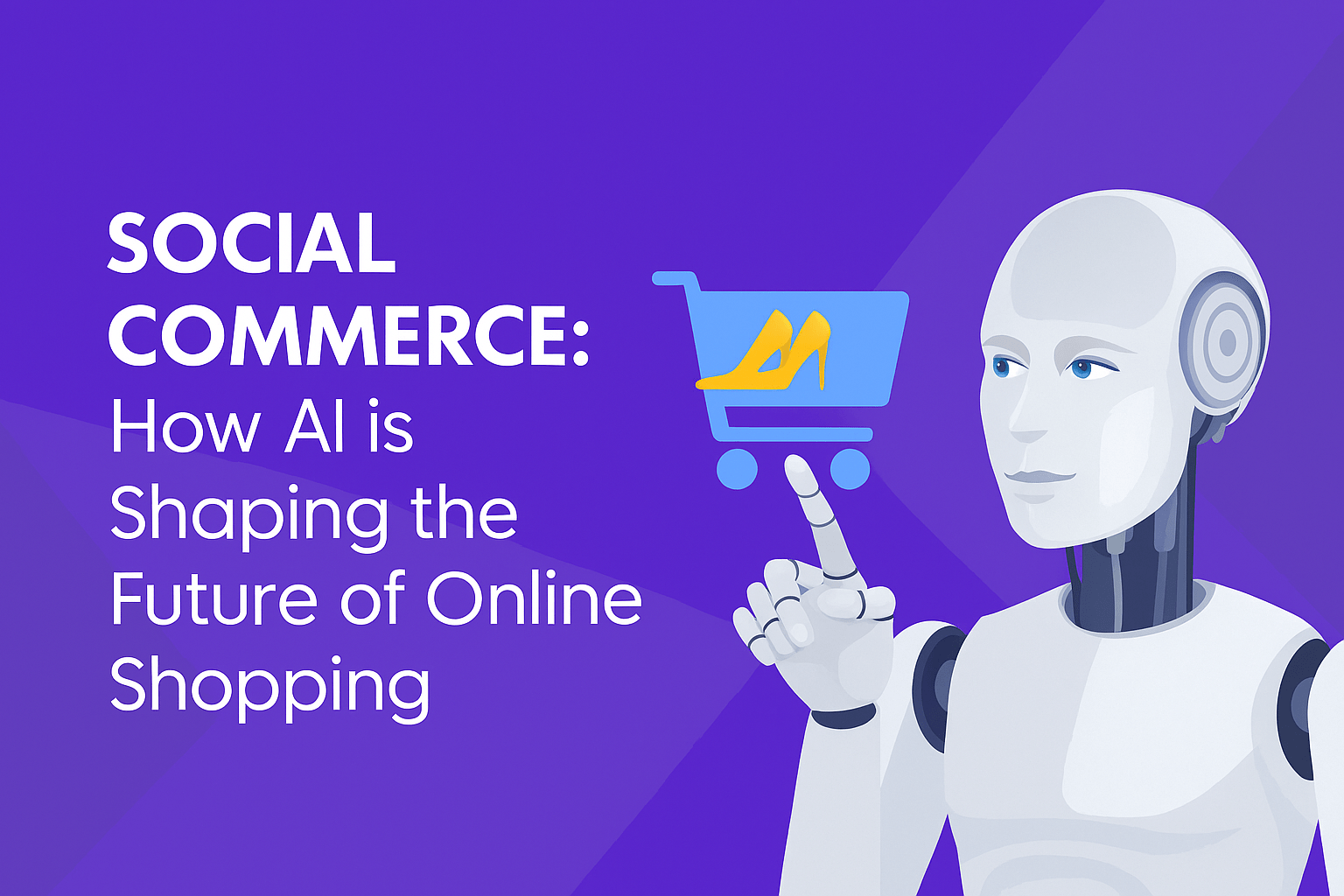Social Commerce: How AI is Shaping the Future of Online Shopping

In the ever-evolving landscape of e-commerce, social commerce has emerged as a transformative force, blending the power of social media with online shopping. At the heart of this revolution lies artificial intelligence (AI), which is redefining how consumers discover, engage with, and purchase products. This article delves into the synergy between AI and social commerce, exploring its impact on online shopping and what the future holds.
What Is Social Commerce?
Social commerce refers to the integration of social media platforms with e-commerce functionalities, enabling users to discover and purchase products directly within their social feeds. Unlike traditional e-commerce, which directs users to external websites, social commerce allows for a seamless shopping experience without leaving the platform.
Platforms like Instagram, TikTok, Facebook, and Pinterest have pioneered this model, offering features such as shoppable posts, live-streamed sales events, and in-app checkout options. This approach capitalizes on the social nature of these platforms, leveraging user-generated content and influencer partnerships to drive sales.
The Role of AI in Social Commerce
Artificial intelligence plays a pivotal role in enhancing the social commerce experience. Here’s how:
1. Personalized Shopping Experiences
AI algorithms analyze user behavior, preferences, and interactions to deliver personalized product recommendations. By understanding individual tastes and shopping habits, AI can suggest items that are more likely to resonate with the user, thereby increasing the chances of a purchase.
2. Visual and Voice Search Capabilities
With advancements in AI, platforms now support visual and voice search functionalities. Users can upload images or use voice commands to find similar products, making the shopping experience more intuitive and accessible.
3. Chatbots and Virtual Assistants
AI-powered chatbots provide real-time assistance to shoppers, answering queries, guiding them through the purchasing process, and offering personalized product suggestions. This not only enhances customer satisfaction but also streamlines the shopping journey.
4. Dynamic Pricing and Inventory Management
AI helps retailers optimize pricing strategies by analyzing market trends, competitor pricing, and demand fluctuations. Additionally, AI can predict inventory needs, ensuring that popular products are always in stock and reducing the likelihood of overstocking.
5. Fraud Detection and Security
AI systems can detect unusual purchasing patterns and flag potential fraudulent activities. By continuously learning from transaction data, these systems enhance the security of online transactions, building trust among consumers.
Trends Shaping the Future of Social Commerce
The convergence of AI and social commerce has given rise to several key trends:
1. Rise of Shoppable Content
Content creators and brands are increasingly producing shoppable content, where products are seamlessly integrated into videos, stories, and posts. This approach allows users to purchase items without interrupting their browsing experience.
2. Augmented Reality (AR) Integration
AR technology, powered by AI, enables users to virtually try on products or visualize how items would look in their environment. This immersive experience reduces uncertainty and enhances consumer confidence in their purchasing decisions.
3. Influencer and User-Generated Content
Influencers and consumers alike are creating content that showcases products in real-life scenarios. This authentic content resonates more with audiences, leading to higher engagement and conversion rates.
4. Live Shopping Events
Platforms are hosting live-streamed shopping events where hosts demonstrate products, answer questions, and offer exclusive deals. AI tools assist in targeting the right audience and personalizing the live shopping experience.
5. Integration with AI Assistants
Virtual assistants like Siri, Alexa, and Google Assistant are being integrated into shopping platforms, allowing users to make purchases through voice commands, further streamlining the shopping process.
Benefits of AI-Driven Social Commerce
The fusion of AI and social commerce offers numerous advantages:
-
Enhanced Personalization: Tailored recommendations improve user satisfaction and increase the likelihood of purchases.
-
Improved Efficiency: Automation of tasks like customer support and inventory management reduces operational costs.
-
Increased Engagement: Interactive features like AR and live shopping events captivate users, leading to higher engagement rates.
-
Better Decision Making: AI analytics provide insights into consumer behavior, helping brands make informed decisions.
Challenges and Considerations
While the integration of AI in social commerce brings about significant benefits, it also presents certain challenges:
-
Data Privacy Concerns: The collection and analysis of user data raise privacy issues that need to be addressed through transparent policies and practices.
-
Dependence on Technology: Over-reliance on AI can lead to issues if the technology fails or malfunctions.
-
Consumer Trust: As AI becomes more prevalent, building and maintaining consumer trust becomes crucial, especially regarding data usage and personalization.
The Future Outlook
Looking ahead, the synergy between AI and social commerce is expected to deepen. Emerging technologies like 5G, edge computing, and blockchain are set to further enhance the capabilities of AI in e-commerce. Brands that leverage these advancements will be better positioned to offer innovative and personalized shopping experiences, staying ahead in the competitive online retail landscape.
The integration of AI into social commerce is not just a trend but a fundamental shift in how online shopping operates. By offering personalized, efficient, and engaging shopping experiences, AI is shaping the future of e-commerce. As technology continues to evolve, so too will the opportunities for brands and consumers alike in the realm of social commerce.
